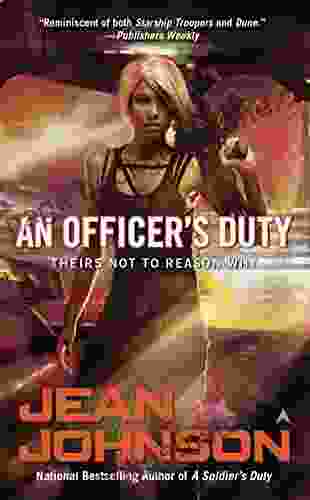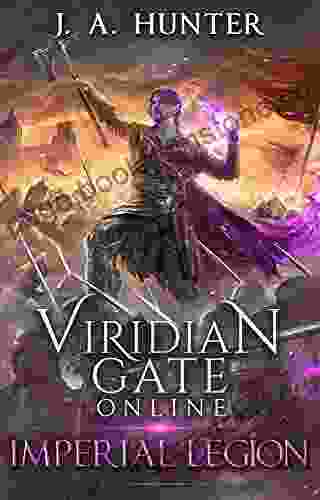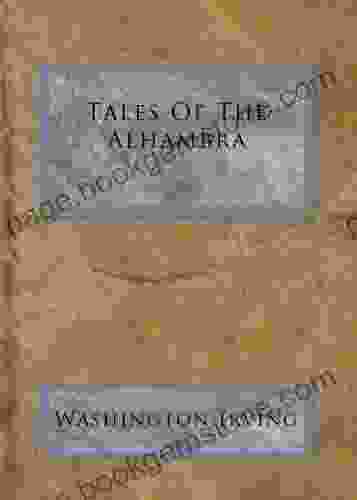An Officer's Duty: Theirs Not to Reason Why

In the realm of military service, a fundamental principle that guides the actions of every officer is the concept of "duty." It is a solemn obligation that transcends personal preferences, beliefs, or doubts, demanding unwavering obedience and loyalty to the mission and the chain of command.
The Genesis of Duty
The concept of duty in the military has its roots in the medieval era, where knights pledged their fealty to their liege lords. This bond of loyalty was based on a reciprocal relationship: the lord provided protection and sustenance, while the knight offered unwavering service and obedience.
4.6 out of 5
| Language | : | English |
| File size | : | 695 KB |
| Text-to-Speech | : | Enabled |
| Screen Reader | : | Supported |
| Enhanced typesetting | : | Enabled |
| X-Ray | : | Enabled |
| Word Wise | : | Enabled |
| Print length | : | 448 pages |
As armies evolved into more complex and sophisticated organizations, the concept of duty became institutionalized. In the 18th century, Prussian military theorist Carl von Clausewitz famously wrote in his seminal work "On War": "The first, the supreme, the most far-reaching act of judgment that the statesman and commander have to make is to establish ... the kind of war on which they are embarking; neither mistaking it for, nor trying to turn it into, something that is alien to its nature."
The Imperative of Obedience
At the heart of an officer's duty lies the imperative of obedience. This concept is not rooted in blind submission or unquestioning compliance but rather in a profound understanding of the consequences of disobeying orders.
In the heat of battle, where time is of the essence and lives are at stake, commanders must be able to rely on their subordinates to follow instructions without hesitation. A single act of disobedience could have catastrophic repercussions, endangering the lives of soldiers and jeopardizing the success of the mission.
The principle of obedience extends beyond the battlefield. In peacetime, officers are responsible for maintaining discipline, upholding the law, and ensuring the smooth functioning of military units. Their ability to exercise effective command relies on their subordinates' willingness to obey their orders.
The Limits of Duty
While duty demands obedience, it does not absolve officers of their moral and ethical responsibilities. There are certain orders that violate fundamental human rights or principles of justice, which officers have a duty to refuse to obey.
The Nuremberg Trials, held after World War II, established the principle of "superior orders" defense. This defense allows individuals to be held criminally liable for their actions even if they were acting under the orders of a superior officer. The trials emphasized that individuals have a duty to their conscience and to humanity that may supersede the duty of obedience.
Balancing Duty with Personal Values
The life of an officer can be a challenging one, often requiring them to grapple with the delicate balance between duty and personal values. There may be times when obeying orders conflicts with their own beliefs or principles.
In such situations, officers must carefully consider the potential consequences of their actions. They must weigh the potential harm to their unit, the mission, and the broader consequences for society. It may be necessary to speak out against illegal or unethical orders, even if it means risking their career or facing punishment.
The Rewards of Duty
The life of an officer is not without its rewards. The opportunity to serve one's country, to lead others, and to make a difference in the world is a profound privilege. Officers who embrace their duty with honor and integrity find fulfillment in their service and a deep sense of accomplishment.
Furthermore, the skills and values they develop as officers, such as leadership, decision-making, and problem-solving, are invaluable in any career path.
The duty of an officer is a multifaceted and demanding concept. It requires unwavering obedience, moral courage, and a deep commitment to serving others. Officers who embrace their duty with honor and integrity play a vital role in maintaining peace, security, and the rule of law.
Their service is a testament to the enduring power of duty and the transformative potential of human character.
4.6 out of 5
| Language | : | English |
| File size | : | 695 KB |
| Text-to-Speech | : | Enabled |
| Screen Reader | : | Supported |
| Enhanced typesetting | : | Enabled |
| X-Ray | : | Enabled |
| Word Wise | : | Enabled |
| Print length | : | 448 pages |
Do you want to contribute by writing guest posts on this blog?
Please contact us and send us a resume of previous articles that you have written.
 Best Book
Best Book Page Flip
Page Flip Bookshelf
Bookshelf Literary loom
Literary loom Chapter
Chapter Bookish
Bookish PageTurner
PageTurner Bibliophile
Bibliophile Story
Story Inkwell
Inkwell Bookworm
Bookworm Labyrinth
Labyrinth Plot Twist
Plot Twist Prose
Prose Paperback
Paperback Storyteller
Storyteller Sanctuary
Sanctuary Fiction
Fiction Reading
Reading Chronicle
Chronicle Read
Read Marc Dipaolo
Marc Dipaolo Ben Shahn
Ben Shahn John Berger
John Berger John Wilkinson
John Wilkinson Ron Collins
Ron Collins Nat Segnit
Nat Segnit Jim Forest
Jim Forest Janet Carlson
Janet Carlson Weston Ochse
Weston Ochse James Hall
James Hall Mary Anne Dorward
Mary Anne Dorward Natalie Livingstone
Natalie Livingstone Roland Kelts
Roland Kelts V F Gutierrez
V F Gutierrez James E Seaver
James E Seaver Kay Doherty Bennett
Kay Doherty Bennett Ivy Mix
Ivy Mix Stephanie Nicole Norris
Stephanie Nicole Norris Patti Mollica
Patti Mollica Stephen L Carter
Stephen L Carter Motorcycle Vagabonds
Motorcycle Vagabonds Jeffrey B Perry
Jeffrey B Perry Norman Eisen
Norman Eisen Steven Konkoly
Steven Konkoly Jesmyn Ward
Jesmyn Ward James Robert Parish
James Robert Parish Eric Vall
Eric Vall Henri Piquer
Henri Piquer Edoardo Albert
Edoardo Albert Marcy Conway
Marcy Conway Zack Meisel
Zack Meisel Kiyoshi Takahashi
Kiyoshi Takahashi Joshua Glenn
Joshua Glenn William L Iggiagruk Hensley
William L Iggiagruk Hensley Misty Copeland
Misty Copeland Karen Hull
Karen Hull Mary Heron Dyer
Mary Heron Dyer Jeanine Cornillot
Jeanine Cornillot Peter Parr
Peter Parr Konchog Lhadrepa
Konchog Lhadrepa M D Cooper
M D Cooper Vaneetha Risner
Vaneetha Risner Jean Muenchrath
Jean Muenchrath Pierre Pochet
Pierre Pochet Sianne Ngai
Sianne Ngai Jim Marrs
Jim Marrs Stephen Smith
Stephen Smith Laurie Tom
Laurie Tom Laxuri Art
Laxuri Art Samantha Irby
Samantha Irby Ryan Leslie
Ryan Leslie Lee J Ames
Lee J Ames Joe Posnanski
Joe Posnanski Valerie Wilson Wesley
Valerie Wilson Wesley Manoah Bowman
Manoah Bowman Tanav Patkar
Tanav Patkar Victoria Lewis
Victoria Lewis Jazz E
Jazz E Leonard Barkan
Leonard Barkan Henry Hemming
Henry Hemming Kim Dana Kupperman
Kim Dana Kupperman Henry David Thoreau
Henry David Thoreau Ulrike Fuchs
Ulrike Fuchs Andrew Loomis
Andrew Loomis Mary Taylor Simeti
Mary Taylor Simeti Roxanne Modafferi
Roxanne Modafferi Ruth Behar
Ruth Behar J A Hinds
J A Hinds Lisa Kleypas
Lisa Kleypas Walter Mosley
Walter Mosley Kimberly Wilkes
Kimberly Wilkes Una Mccormack
Una Mccormack Taylor Moore
Taylor Moore Kathryn Stockett
Kathryn Stockett Jelani Cobb
Jelani Cobb Jan Cohen Cruz
Jan Cohen Cruz Mauricio Savarese
Mauricio Savarese Kristen Faber
Kristen Faber R Brady Frost
R Brady Frost Quentin Tarantino
Quentin Tarantino Martha Maccallum
Martha Maccallum Stefhen F D Bryan
Stefhen F D Bryan Nobuko Miyamoto
Nobuko Miyamoto Theo Farrington
Theo Farrington Kresley Cole
Kresley Cole James Anthony
James Anthony Richard Blanco
Richard Blanco J Foord
J Foord Mike Downs
Mike Downs J Nichole
J Nichole Susan Nagel
Susan Nagel Regine Abel
Regine Abel Bonny Snowdon
Bonny Snowdon Jacquelyn Descanso
Jacquelyn Descanso Jennifer L Scott
Jennifer L Scott Jonathan Dehart
Jonathan Dehart John Clifford
John Clifford Lali Duperti
Lali Duperti Jason Kingsley
Jason Kingsley Laura Beth Love
Laura Beth Love Tom Segev
Tom Segev Laura Slater
Laura Slater Ilana Kurshan
Ilana Kurshan Kat Varano
Kat Varano Sheila Simkin
Sheila Simkin John Guy
John Guy Kris Schnee
Kris Schnee Northrop Davis
Northrop Davis Loet Velmans
Loet Velmans Noa Baum
Noa Baum Honey Phillips
Honey Phillips Tom Swimm
Tom Swimm Ava Archer
Ava Archer Steve Berry
Steve Berry Seth Rain
Seth Rain Elinor Lipman
Elinor Lipman Hourly History
Hourly History Stefan Kottwitz
Stefan Kottwitz Carol Miller
Carol Miller Susie Hodge
Susie Hodge Philip Gourevitch
Philip Gourevitch Martin Gilbert
Martin Gilbert Slim Randles
Slim Randles Zanna Goldhawk
Zanna Goldhawk Megan Mackie
Megan Mackie Rudolf Koch
Rudolf Koch K C Mills
K C Mills Justin M Monehen
Justin M Monehen Marc Foster
Marc Foster Jack C Ramsay
Jack C Ramsay Kenneth French
Kenneth French Jim Mccarthy
Jim Mccarthy William Gray
William Gray Jean Hugard
Jean Hugard James Baldwin
James Baldwin Jasmine Tritten Llc
Jasmine Tritten Llc Laureen Nussbaum
Laureen Nussbaum Victoria Charles
Victoria Charles Tade Thompson
Tade Thompson Sherelle Green
Sherelle Green Willie Mays
Willie Mays Ryan Dunlavey
Ryan Dunlavey Jessica Alba
Jessica Alba Kate Rawles
Kate Rawles Kristal Wick
Kristal Wick Peter F Stevens
Peter F Stevens Niqua Nakell
Niqua Nakell Linda Lael Miller
Linda Lael Miller Julia Fowler
Julia Fowler Henry B Culver
Henry B Culver Roy Liebman
Roy Liebman Manny Serrato
Manny Serrato James J Downes
James J Downes Mariam V Lawal
Mariam V Lawal Keith Osborn
Keith Osborn Bob Wilbanks
Bob Wilbanks Languages World
Languages World Terrance Zepke
Terrance Zepke Ariel Sabar
Ariel Sabar E C Godhand
E C Godhand W Kamau Bell
W Kamau Bell Meredith Talusan
Meredith Talusan Parnaz Foroutan
Parnaz Foroutan Melissa Washburn
Melissa Washburn Shawn Levy
Shawn Levy Jasper T Scott
Jasper T Scott Stephen T Moskey
Stephen T Moskey Lauren Francis Sharma
Lauren Francis Sharma Nancy Marie Mithlo
Nancy Marie Mithlo Michael Head
Michael Head Michael Peter Bolus
Michael Peter Bolus Shirtaloon
Shirtaloon Ramie Targoff
Ramie Targoff Hilary Wilson
Hilary Wilson James Claflin
James Claflin John Kane
John Kane Stephen Orr
Stephen Orr Jeff Hobbs
Jeff Hobbs Tasha Black
Tasha Black Reid Mitenbuler
Reid Mitenbuler Johanna Lindsey
Johanna Lindsey Arthur Miller
Arthur Miller Michael Kluckner
Michael Kluckner Jeff Howard
Jeff Howard Todd Wassel
Todd Wassel David Sherwin
David Sherwin Katherine Arden
Katherine Arden John Lawson
John Lawson Patrick Dennis
Patrick Dennis Kia Jones
Kia Jones Jo Goodman
Jo Goodman Jonathan Jones
Jonathan Jones Kate Flint
Kate Flint Kim Fairley
Kim Fairley Steph The Hammer Hammerman
Steph The Hammer Hammerman John C Rigdon
John C Rigdon John R Kemp
John R Kemp Waheed Arian
Waheed Arian T O Smith
T O Smith Tom Dunkel
Tom Dunkel Jodi Thomas
Jodi Thomas Xueting Christine Ni
Xueting Christine Ni Jeffery J Dyas
Jeffery J Dyas Juliette Aristides
Juliette Aristides James R Rush
James R Rush Stephen Hunter
Stephen Hunter Jaime Lowe
Jaime Lowe Jerry Vermilye
Jerry Vermilye Traci Bunkers
Traci Bunkers Lizzie Damilola Blackburn
Lizzie Damilola Blackburn James Fairbairn
James Fairbairn Eva Van Loon
Eva Van Loon Roy John
Roy John Richard R Brettell
Richard R Brettell Ida B Wells
Ida B Wells Jason Waguespack
Jason Waguespack Italo Calvino
Italo Calvino John Tateishi
John Tateishi William Gibson
William Gibson Ja Huss
Ja Huss Jonas Peters
Jonas Peters Sanford Meisner
Sanford Meisner Jeanne St James
Jeanne St James Jennifer Lynne Matthews Fairbanks
Jennifer Lynne Matthews Fairbanks Neal Stephenson
Neal Stephenson Marion Zimmer Bradley
Marion Zimmer Bradley Slim Dusty
Slim Dusty Sarah Simon
Sarah Simon Jansen Art Studio
Jansen Art Studio Steve Spill
Steve Spill Travis Rieder
Travis Rieder Thefirstdefier
Thefirstdefier Janet Adler
Janet Adler Kathryn Warner
Kathryn Warner Michael Harkins
Michael Harkins Michael Moorcock
Michael Moorcock William Reyland
William Reyland Laylah Roberts
Laylah Roberts Jacquie Abram
Jacquie Abram John Joseph Adams
John Joseph Adams Stuart Woods
Stuart Woods Tarry Lindquist
Tarry Lindquist Jean M Roberts
Jean M Roberts Wayne J Lutz
Wayne J Lutz Isabel Wroth
Isabel Wroth Jonathan Drori
Jonathan Drori James Lawson
James Lawson Maeve Binchy
Maeve Binchy James Huntington
James Huntington John Pike
John Pike Karen Lindeman
Karen Lindeman Shea Ernshaw
Shea Ernshaw Sonia Sotomayor
Sonia Sotomayor Shonda Buchanan
Shonda Buchanan Katrina Rodabaugh
Katrina Rodabaugh Irene Latham
Irene Latham Melanie Clarke
Melanie Clarke Julian Curry
Julian Curry John Szpunar
John Szpunar Susan Zwerman
Susan Zwerman Martin Ursell
Martin Ursell Sarah Vowell
Sarah Vowell Maitland Mcdonagh
Maitland Mcdonagh Julia L Foulkes
Julia L Foulkes Mark Willenbrink
Mark Willenbrink Kira Salak
Kira Salak Kevin Budelmann
Kevin Budelmann S J A Turney
S J A Turney Jeff Mellem
Jeff Mellem David Railton
David Railton Lynn H Nicholas
Lynn H Nicholas Steve Kaffen
Steve Kaffen Ilene Strizver
Ilene Strizver Jeff Vandermeer
Jeff Vandermeer John Man
John Man Larry Loftis
Larry Loftis Lonely Planet
Lonely Planet Joe Fig
Joe Fig Richard Lecocq
Richard Lecocq Joe Garcia
Joe Garcia Jessica Shorstein
Jessica Shorstein Ramez Naam
Ramez Naam Karen Homer
Karen Homer Jennifer Campbell
Jennifer Campbell Leslie Marmon Silko
Leslie Marmon Silko Scott Pratt
Scott Pratt Camilla Townsend
Camilla Townsend Kindle Edition
Kindle Edition Jeneane Lunn
Jeneane Lunn Steve Charney
Steve Charney Roger Ebert
Roger Ebert Julia Zarankin
Julia Zarankin Dr Lucie Rivera
Dr Lucie Rivera Plutarch
Plutarch Yuta Aoki
Yuta Aoki Kaoru Nonomura
Kaoru Nonomura Monica Byrne
Monica Byrne Mira Schor
Mira Schor Patricia Sands
Patricia Sands Kevin Ikenberry
Kevin Ikenberry David Menconi
David Menconi Sandra M Z Armstrong
Sandra M Z Armstrong Second Edition Kindle Edition
Second Edition Kindle Edition R G Richardson
R G Richardson Jd Chandler
Jd Chandler Marty Sklar
Marty Sklar Baby Professor
Baby Professor Washington Irving
Washington Irving Yvonne Moore
Yvonne Moore Maria Adolfsson
Maria Adolfsson Sonya Lajuan
Sonya Lajuan Tim Testu
Tim Testu Mark Griffin
Mark Griffin Michael Roberts
Michael Roberts Thomas Lamosse
Thomas Lamosse Martin Pistorius
Martin Pistorius Thomas J Campanella
Thomas J Campanella Jami Gigot
Jami Gigot Jason Kander
Jason Kander J L Heilbron
J L Heilbron Volta Voloshin Smith
Volta Voloshin Smith James Hunter
James Hunter John Potvin
John Potvin Paul Carter
Paul Carter Jose Vadi
Jose Vadi Robert C Wood
Robert C Wood P Scott Cunningham
P Scott Cunningham Jean Paul Labourdette
Jean Paul Labourdette Mimi Thorisson
Mimi Thorisson Zuri Day
Zuri Day Vaughn Patillo
Vaughn Patillo Sarah Jackson
Sarah Jackson Joshua Dalzelle
Joshua Dalzelle Patrick Dimarchi
Patrick Dimarchi Hilary Bradt
Hilary Bradt Paul Gauguin
Paul Gauguin Robyn Carr
Robyn Carr Judy Gay Matthews
Judy Gay Matthews Insight Guides
Insight Guides Michael Curtis
Michael Curtis Lawrence Durrell
Lawrence Durrell John Hindmarsh
John Hindmarsh Tim Jeal
Tim Jeal Mike Brooks
Mike Brooks Marjorie R Williams
Marjorie R Williams Yvonne Claypole
Yvonne Claypole Hiroko Yoda
Hiroko Yoda Jeremy Black
Jeremy Black Rolf Giesen
Rolf Giesen J D Robb
J D Robb Brad Goreski
Brad Goreski Nelson George
Nelson George James H Cobb
James H Cobb Kai Kupferschmidt
Kai Kupferschmidt Phillip Barlag
Phillip Barlag Ian Blakemore
Ian Blakemore Joy Avery
Joy Avery Karpov Kinrade
Karpov Kinrade Bianca Del Rio
Bianca Del Rio Howard W French
Howard W French Robert Mccammon
Robert Mccammon Kent Blansett
Kent Blansett Russell Smith
Russell Smith Mary Jordan
Mary Jordan Chris Kennedy
Chris Kennedy Jeff Blumenfeld
Jeff Blumenfeld Joyce Yee
Joyce Yee Rani St Pucchi
Rani St Pucchi Kyle Anthony
Kyle Anthony Danielle Joseph
Danielle Joseph Suhas Mantri
Suhas Mantri Hattie Gossett
Hattie Gossett Tricia Cornell
Tricia Cornell Shirish Deshpande
Shirish Deshpande D K Holmberg
D K Holmberg Jason L Riley
Jason L Riley Mary Antin
Mary Antin Alec Potrero
Alec Potrero Jeff Rovin
Jeff Rovin Ian Condry
Ian Condry E M Hardy
E M Hardy Darby Penney
Darby Penney Jerry Saltz
Jerry Saltz Philip Gwynne Jones
Philip Gwynne Jones J Nell
J Nell Lisa Wixon
Lisa Wixon Fran Macilvey
Fran Macilvey Ping Fu
Ping Fu Matthew Israel
Matthew Israel Viet Thanh Nguyen
Viet Thanh Nguyen Johno Ellison
Johno Ellison Tom Bancroft
Tom Bancroft Matt Zoller Seitz
Matt Zoller Seitz Travis Jeppesen
Travis Jeppesen Renae Anderson
Renae Anderson Jean Johnson
Jean Johnson James Monaco
James Monaco Jason Fry
Jason Fry Michael Dooley
Michael Dooley Mary Turzillo
Mary Turzillo Rosie Rivera
Rosie Rivera Tanya Tagaq
Tanya Tagaq James Barrington
James Barrington Annette Gisby
Annette Gisby James Joseph
James Joseph Lisa Edwards
Lisa Edwards Nancy Mitford
Nancy Mitford Tim Fisher
Tim Fisher Ross Buzzell
Ross Buzzell Tom Santopietro
Tom Santopietro Robin Hobb
Robin Hobb Peter Watts
Peter Watts Veronica Li
Veronica Li P J Thorndyke
P J Thorndyke Jan Wahl
Jan Wahl Marilyn Laura Bowman
Marilyn Laura Bowman James Patterson
James Patterson Sylvia Townsend Warner
Sylvia Townsend Warner Thomas Weisser
Thomas Weisser Robert Rosen
Robert Rosen Joe Haldeman
Joe Haldeman Bruce Hanington
Bruce Hanington Nana Kwame Adjei Brenyah
Nana Kwame Adjei Brenyah Steve Parker
Steve Parker Marian Lindberg
Marian Lindberg K Webster
K Webster Vincent Miller
Vincent Miller Suzanne Brooker
Suzanne Brooker Keith Fenwick
Keith Fenwick David Lynch
David Lynch Shi Davidi
Shi Davidi Robert D Young
Robert D Young Ran Walker
Ran Walker Joan Mellen
Joan Mellen Rob Wareing
Rob Wareing Will Castro
Will Castro Tom Glover
Tom Glover Marjorie Agosin
Marjorie Agosin Reymundo Sanchez
Reymundo Sanchez Joscha Remus
Joscha Remus Nolan Clark
Nolan Clark Phil Chan
Phil Chan John Scotney
John Scotney Jodi Ellen Malpas
Jodi Ellen Malpas Patti M Hall
Patti M Hall Robert B Pippin
Robert B Pippin Carlyn Beccia
Carlyn Beccia Tessa Fontaine
Tessa Fontaine Ian Littlewood
Ian Littlewood James Graham Baker
James Graham Baker Vicky Gray
Vicky Gray Mark Rothko
Mark Rothko Paula M Block
Paula M Block Jimmy O Yang
Jimmy O Yang J T Nicholas
J T Nicholas James Halliday
James Halliday Susan Cross
Susan Cross Lally Brown
Lally Brown J R Ward
J R Ward Jane Goodall
Jane Goodall Mitchell Albala
Mitchell Albala Butch Hartman
Butch Hartman Steven W Brallier
Steven W Brallier Justin Sloan
Justin Sloan Kevin Hart
Kevin Hart Mel Dau
Mel Dau Bruce Cook
Bruce Cook Lauren Bastide
Lauren Bastide Karen Attman
Karen Attman Rick Scott
Rick Scott Jack Hitt
Jack Hitt Hillary S Webb
Hillary S Webb Stef Smulders
Stef Smulders Roger Zelazny
Roger Zelazny Ryan Jennings
Ryan Jennings Michelle Rial
Michelle Rial Morris Rossabi
Morris Rossabi Dean Dalton
Dean Dalton Nora Ephron
Nora Ephron Julia Rothman
Julia Rothman Nancy Ditomaso
Nancy Ditomaso Jason Cochran
Jason Cochran Steve Stevenson
Steve Stevenson Isabel Santos
Isabel Santos Charles E Gannon
Charles E Gannon Tiffany Haddish
Tiffany Haddish Susan Kesler Simpson
Susan Kesler Simpson Ishmael Beah
Ishmael Beah Jeff Shaara
Jeff Shaara Theodore Menten
Theodore Menten Sam Pivnik
Sam Pivnik Zia Knight
Zia Knight Deborah Frisch
Deborah Frisch J J Mcavoy
J J Mcavoy E H Raskin
E H Raskin Kandra Churchwell
Kandra Churchwell Supersummary
Supersummary Lorna Jane Harvey
Lorna Jane Harvey Isaac Asimov
Isaac Asimov Jack Campbell
Jack Campbell Dorit Elisha
Dorit Elisha Stephen Kurkjian
Stephen Kurkjian Vera Nazarian
Vera Nazarian Lina Acevedo
Lina Acevedo Paul Bonnet
Paul Bonnet Margaret Hermes
Margaret Hermes Karen Cheng
Karen Cheng Jessica Gadziala
Jessica Gadziala Maureen T Corrigan
Maureen T Corrigan Tina Turner
Tina Turner M William Phelps
M William Phelps Phoebe Hoban
Phoebe Hoban Marcus Samuelsson
Marcus Samuelsson Interweave Editors
Interweave Editors Jim Hutchinson
Jim Hutchinson Amanda Arneill
Amanda Arneill Jana K Lipman
Jana K Lipman Michael Hone
Michael Hone Uri Mcmillan
Uri Mcmillan Iris Bolling
Iris Bolling Katharine Branning
Katharine Branning Jon Steel
Jon Steel J D Sullivan
J D Sullivan Pat Kramer
Pat Kramer Karin Evans
Karin Evans James Swallow
James Swallow Jack London
Jack London Pilar M Herr
Pilar M Herr Luis J Rodriguez
Luis J Rodriguez Zogarth
Zogarth Marisa Renee Lee
Marisa Renee Lee Joshua T Calvert
Joshua T Calvert Brian Trent
Brian Trent Isak Dinesen
Isak Dinesen Ronald Bergan
Ronald Bergan John Armstrong
John Armstrong Damon Tweedy
Damon Tweedy Sally R Ball
Sally R Ball Marcello Di Cintio
Marcello Di Cintio Jay Brian Schoonmaker
Jay Brian Schoonmaker Brandon Taylor
Brandon Taylor Sean Wallace
Sean Wallace Merry White
Merry White June Mcleod
June Mcleod Nicholas Sammond
Nicholas Sammond Kaitlyn Dornbier
Kaitlyn Dornbier Harold Speed
Harold Speed Iain Rob Wright
Iain Rob Wright Ruth Superhal
Ruth Superhal Ted Chiang
Ted Chiang Helena Reckitt
Helena Reckitt C J Cherryh
C J Cherryh Karen Stocker
Karen Stocker Christina Sharpe
Christina Sharpe Larry Niven
Larry Niven Louis L Amour
Louis L Amour Pete Salgado
Pete Salgado Vikki Haffenden
Vikki Haffenden Melissa Fehr
Melissa Fehr Tyanna
Tyanna Jason Cranford Teague
Jason Cranford Teague Linda Langner
Linda Langner John Preston
John Preston James Grant
James Grant Judy Friesem
Judy Friesem Steve Hulett
Steve Hulett Jacqueline Winspear
Jacqueline Winspear Susan Hable
Susan Hable Melissa Maerz
Melissa Maerz Paul Arthur Berkman
Paul Arthur Berkman Henry Fraser
Henry Fraser Martina M Lanier
Martina M Lanier Obaidur Rahaman
Obaidur Rahaman
Light bulbAdvertise smarter! Our strategic ad space ensures maximum exposure. Reserve your spot today!

 Jackson BlairThe Gospel of Judas: Second Edition - Unraveling the Secrets of the Lost Text
Jackson BlairThe Gospel of Judas: Second Edition - Unraveling the Secrets of the Lost Text H.G. WellsFollow ·16.6k
H.G. WellsFollow ·16.6k Carl WalkerFollow ·6.2k
Carl WalkerFollow ·6.2k Felix HayesFollow ·12k
Felix HayesFollow ·12k Grant HayesFollow ·9.7k
Grant HayesFollow ·9.7k Samuel BeckettFollow ·5.6k
Samuel BeckettFollow ·5.6k Clark BellFollow ·16.6k
Clark BellFollow ·16.6k Max TurnerFollow ·5.5k
Max TurnerFollow ·5.5k Francis TurnerFollow ·19.8k
Francis TurnerFollow ·19.8k

 Holden Bell
Holden BellFriend Indeed One: A Comprehensive Guide to the Essential...
In the tapestry of human existence,...

 Gustavo Cox
Gustavo CoxBend Not Break: Life in Two Worlds
In the tapestry of human...

 Andy Hayes
Andy HayesDiscover How To Create Stunning Images With Useful And...
Drawing is a great way to...

 Aleksandr Pushkin
Aleksandr PushkinThe Rise and Fall of Latin Queen: An Exploration into the...
Latin music has captivated audiences...

 Ira Cox
Ira CoxUnveiling the Soul of Desert Painting: A Journey into the...
In the vast...
4.6 out of 5
| Language | : | English |
| File size | : | 695 KB |
| Text-to-Speech | : | Enabled |
| Screen Reader | : | Supported |
| Enhanced typesetting | : | Enabled |
| X-Ray | : | Enabled |
| Word Wise | : | Enabled |
| Print length | : | 448 pages |












